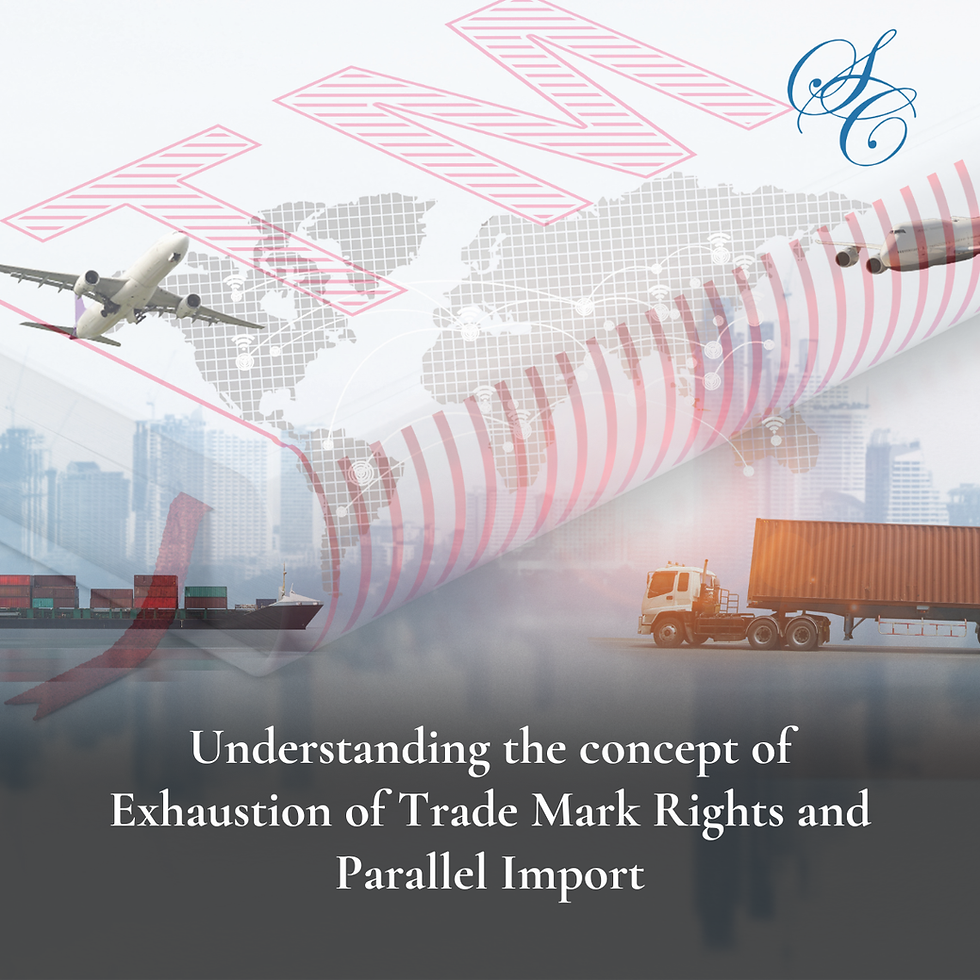Recent trends in Territorial Jurisdiction in the Delhi High Court
- Sarwajeet Singh
- Nov 28, 2017
- 5 min read
Over the years, the Delhi High Court has come to be recognized as the most preferred court in India for filing trade mark suits, primarily because of judges who have exposure to, and understand, nuances of the applicable law. Generally viewed as pro-plaintiff, in recent times, this view appears to be changing, in particular because of issues relating to territorial jurisdiction. This post captures the recent developments on the much debated issue of territorial jurisdiction in the Delhi High Court.
An Additional Forum to Sue – A background
In India, a trade mark infringement suit may, simply speaking, be filed in a court having jurisdiction in the place where (a) the plaintiff resides or carries on business; or (b) where the defendant resides or carries on business; or (c) where the cause of action, partly or wholly, arises. While territorial jurisdiction of the court where the defendant resides/does business or cause of action arises is conferred by the civil code governing court practice in India, the law governing trade marks has created an additional forum for plaintiffs to sue, i.e. where the plaintiff resides/ does business.
In cases where the defendant resides/does business in Delhi, or the cause of action arises therein, there is little to contemplate on the Court’s territorial jurisdiction. The Court has, off late, however, taken a harsh stand in cases where the defendant or its activities have no connection with Delhi, but only the plaintiff does business in Delhi. It has recognized ‘cause of action’ as continuing to have a co-relation with the issue of territorial jurisdiction. In early 2016 in Ultra Home Construction Pvt. Ltd. v. Purushottam Kumar Chaubey and Ors., the bench formulated a matrix of situations when a plaintiff can sue in courts having jurisdiction where the plaintiff (being a corporation/company) has principal/subordinate offices. Importantly, a plaintiff cannot sue in Delhi courts even if its subordinate/branch office is in Delhi, if the cause of action arises at the place where its principal/registered office is located. Likewise, a plaintiff cannot sue in Delhi courts even if its principal/registered office is in Delhi, if the cause of action arises at the place where its subordinate/branch office is located. In effect, if there is an overlap between the place where the cause of action arises and where one of plaintiff’s offices is located, the suit must be filed at that place, and no other.
The Evolution
Following the footsteps of the division bench, in late 2016, a highly acclaimed single judge of the Delhi High Court returned plaints and vacated interim orders on the ground of lack of territorial jurisdiction (Piruz Khambatta & Anr. v. Rajmohan Rupaji Modi & Ors. (popularly, the RASNA case) and Pepsico Inc. & Anr. v. M/S. Sagarnil Enterprise & Ors.). In RASNA, the plaintiff filed the suit in the Delhi High Court on account of having a branch office in Delhi and a minor part of the cause of action arising in Delhi. The judge returned the plaint in as much as the plaintiff’s (as also the defendant’s) principal place of business was located at the place where the cause of action essentially arose. In Pepsico, the first plaintiff’s principal place of business was located in the USA. Its wholly owned subsidiary (second plaintiff) had its principal place of business in a state bordering Delhi, and a branch office in Delhi. The suit was returned because neither the plaintiff’s principal office, nor the defendant’s office or the cause of action arose in Delhi.
Contrary to the stringent view taken in the above referred cases, another single judge of the Court, very recently in August 2017, in Burger King Corporation v. Mr. Ashraf & Anr., admitted a suit merely on account of the plaintiff’s trademarks (forming core of the subject matter of the suit) being registered with the Trade Marks Registry, Delhi. The judge was of the view that the infraction by the defendant of the plaintiff’s statutory rights in Delhi was sufficient for an integral part of the cause of action arising within its territorial jurisdiction.
The year 2017 saw another lawsuit concerning a permitted user’s right to institute a suit for trade mark infringement (P.K. Sen v. Exxon Mobile Corporation & Anr.) being returned for lack of jurisdiction by a division bench of the Court. The first plaintiff was a company incorporated in the USA with no office in India, with the second plaintiff being its wholly owned subsidiary. The second plaintiff was the permitted user of the subject trade mark in India through a license agreement with the first plaintiff, and had a registered office in Delhi. The defendant carried on business elsewhere and had no business in Delhi. The Court affirmed that a permitted user is prohibited from instituting a suit for trade mark infringement. It returned the suit, ruling that even if use of the mark by the permitted user was deemed use by the first plaintiff, and that the Delhi office was the first plaintiff’s branch office, even then it would not have the requisite jurisdiction to entertain the case in as much as the cause of action arose elsewhere.
Online Jurisdiction
The last one year also witnessed a series of cases on territorial jurisdiction in which one or more party carried on business online. In such cases, unless it is proved that the party’s web site specifically targets consumers in Delhi, or that the web site is interactive and enables to conclude a commercial transaction with the web site user in Delhi, a party cannot be said to be carrying on business in Delhi.
For instance, a single judge in Federal Express Corporation v. Fedex Securities Ltd. & Ors. this April, returned a suit for lack of jurisdiction despite the defendant allegedly carrying on business in Delhi through its web site. The principal registered office of the Plaintiff was in the USA and its branch office was in Delhi. The defendants’ registered offices were in Mumbai. The plaintiff invoked the Court’s territorial jurisdiction on, inter alia, the ground that the defendants offer and advertise their services through their web sites all over India, including to clients in Delhi, and therefore carry on business in Delhi. The Court returned the suit since the plaintiff failed to show that the defendants’ web sites specifically targeted consumers in Delhi or that it was possible to conclude commercial transactions through the web site.
In another recent decision, Icon Health and Fitness, Inc. v. Sheriff Usman & Anr., both the plaintiff and the defendants had registered offices outside India. Further, both the plaintiff and the defendants offered their respective products through e-commerce portals such as amazon.in and apps available on mobile stores, which can be accessed and operated from all over the country, including in Delhi. The Court deemed the defendants to carry on business in Delhi.
Conclusion
The fate of each trade mark case appears to depend on the acumen of the judge hearing it. However, till the time a full bench considers the issue of the extent of the plaintiff’s freedom to sue at places where it carries on business, filing at places where solely the plaintiff resides or carries on business comes with the risk of the suit being thrown out for dearth of territorial jurisdiction. Having seen the Delhi High Court losing its sheen of being a pro-plaintiff court, erring on the side of caution, and filing suits at places which fit within the factual matrix laid down in Ultra Homes, is the best way forward.




Comments